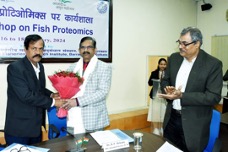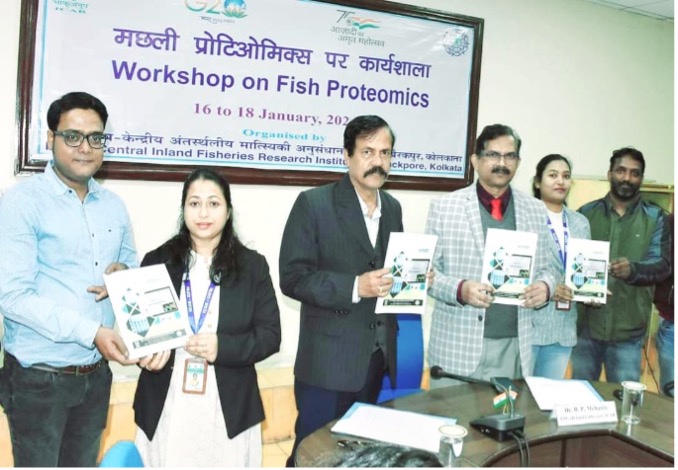Overview
Publications
Recruitment
Intranet
CIFRI Corners'
The 03-days workshop is organized by ICAR-Central Inland Fisheries Research Institute for faculty, researchers, and students from l6 to 18th January 2024 at the headquarters of the Institute located at Barrackpore, Kolkata – 700 120, West Bengal. Dr. B.P. Mohanty, ADG (Inland fisheries), New Delhi, and Dr. B.K. Das, Director of ICAR-CIFRI inaugurated the program and emphasized the need for fish Proteomics technologies and its prospects to address key areas in aquaculture. Dr. B.P. Mohanty highlighted the importance of proteomics tools in the food industry, disease diagnosis, clinical studies, biomarker discovery, and drug discovery. Later, Dr. B.K. Das emphasized the role of proteomics technology in the study of interactions, function, composition, and structures of proteins and their cellular activities in fish, bacteria, fungi, or any organism or cell type.

 The workshop curriculum was designed to cover various proteomics techniques along with available bioinformatics resources for their applications in different areas of fisheries-related to safety, quality, and health. The participants were also given hands-on training on Protein isolation and estimation, 1D gel electrophoresis, 2D gel electrophoresis, Protein modelling (2D and 3D) and Fish mucus zymography. The workshop was attended by Faculties, UG and PG students, researchers, and faculties from the Central University of Himachal Pradesh; Brainwork University, Barasat; College of Fisheries, Gumla; University of Burdwan and College of Fisheries, Dholi. Dr. B.K. Das, Mr. P. Maurya, Dr. V. Kumar, Dr. S. Roy and Dr. S. Ganguly coordinated the workshop.
The workshop curriculum was designed to cover various proteomics techniques along with available bioinformatics resources for their applications in different areas of fisheries-related to safety, quality, and health. The participants were also given hands-on training on Protein isolation and estimation, 1D gel electrophoresis, 2D gel electrophoresis, Protein modelling (2D and 3D) and Fish mucus zymography. The workshop was attended by Faculties, UG and PG students, researchers, and faculties from the Central University of Himachal Pradesh; Brainwork University, Barasat; College of Fisheries, Gumla; University of Burdwan and College of Fisheries, Dholi. Dr. B.K. Das, Mr. P. Maurya, Dr. V. Kumar, Dr. S. Roy and Dr. S. Ganguly coordinated the workshop.










